【高中英语语法】情态动词和虚拟语气 情态动词
- 格式:docx
- 大小:31.53 KB
- 文档页数:5
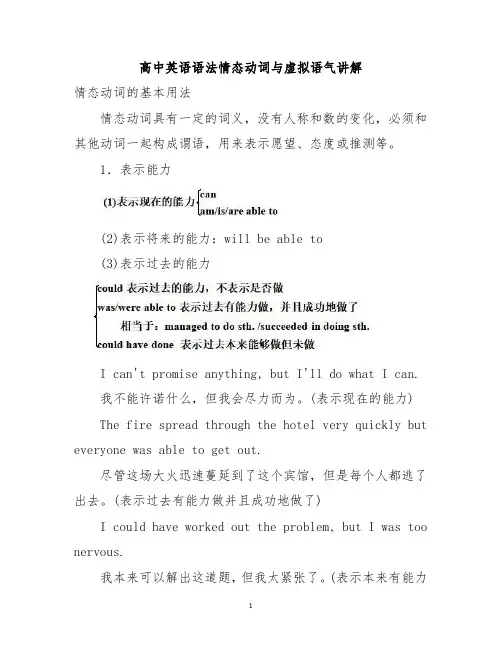
高中英语语法情态动词与虚拟语气讲解情态动词的基本用法情态动词具有一定的词义,没有人称和数的变化,必须和其他动词一起构成谓语,用来表示愿望、态度或推测等。
1.表示能力(2)表示将来的能力:will be able to(3)表示过去的能力I can't promise anything, but I'll do what I can.我不能许诺什么,但我会尽力而为。
(表示现在的能力)The fire spread through the hotel very quickly but everyone was able to get out.尽管这场大火迅速蔓延到了这个宾馆,但是每个人都逃了出去。
(表示过去有能力做并且成功地做了)I could have worked out the problem, but I was too nervous.我本来可以解出这道题,但我太紧张了。
(表示本来有能力做但未做)2.表示推测(可能性)可能性可分为客观的可能性和具体事情实际发生的可能性两种。
(1)客观的可能性并不表示具体某事是否会发生,而用来说明人或事物的特征。
情态动词can可用于肯定句中表示客观的(或理论的)可能性,而表示具体事情实际发生的可能性时, can 一般不用于肯定句。
Accidents can happen on such rainy days.在这样的多雨天气里可能会发生事故。
(表示客观的可能性)We may go to the cinema tonight, but we are not sure yet.今晚我们可能去看电影,但还没确定。
(表示实际可能性,不用can)(2)表示具体事情实际发生的可能性表示具体事情实际发生的可能性的层次(由强及弱)比较:①在肯定句中表示推测(must/have to, should/ought to, may, might, could)a.当说话者表达怀疑或犹豫之意时,需用may, might或could, 其中might, could比may所表达的怀疑或犹豫之意更强。
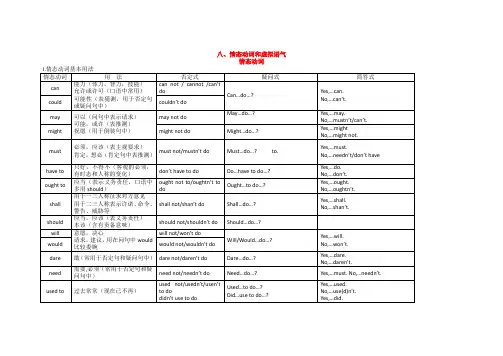

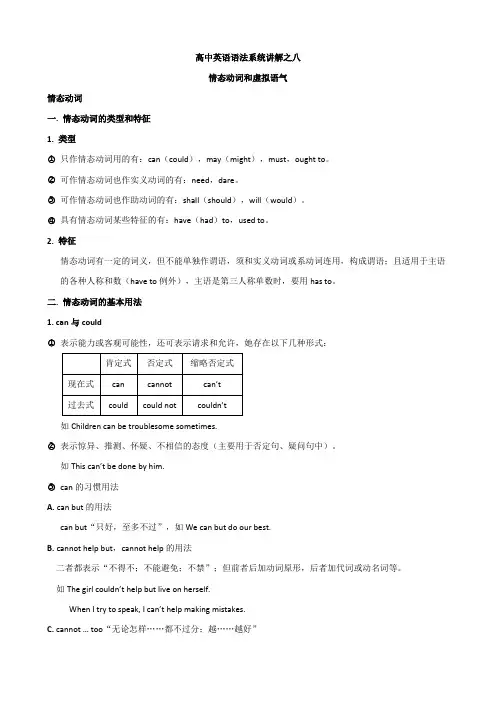
高中英语语法系统讲解之八情态动词和虚拟语气情态动词一. 情态动词的类型和特征1. 类型○1只作情态动词用的有:can(could),may(might),must,ought to。
○2可作情态动词也作实义动词的有:need,dare。
○3可作情态动词也作助动词的有:shall(should),will(would)。
○4具有情态动词某些特征的有:have(had)to,used to。
2. 特征情态动词有一定的词义,但不能单独作谓语,须和实义动词或系动词连用,构成谓语;且适用于主语的各种人称和数(have to例外),主语是第三人称单数时,要用has to。
二. 情态动词的基本用法1. can与could○1表示能力或客观可能性,还可表示请求和允许,她存在以下几种形式:如Children can be troublesome sometimes.○2表示惊异、推测、怀疑、不相信的态度(主要用于否定句、疑问句中)。
如This can’t be done by him.○3can的习惯用法A. can but的用法can but“只好,至多不过”,如We can but do our best.B. cannot help but,cannot help的用法二者都表示“不得不;不能避免;不禁”;但前者后加动词原形,后者加代词或动名词等。
如The girl couldn’t help but live on herself.When I try to speak, I can’t help making mistakes.C. cannot … too“无论怎样……都不过分;越……越好”如We can’t thank you too much for what you have done for us。
We can not be too careful to cross the road.温馨提示:○1can与be able to:can表示有能力做某事,be able to表示通过努力、克服困难做成某事。
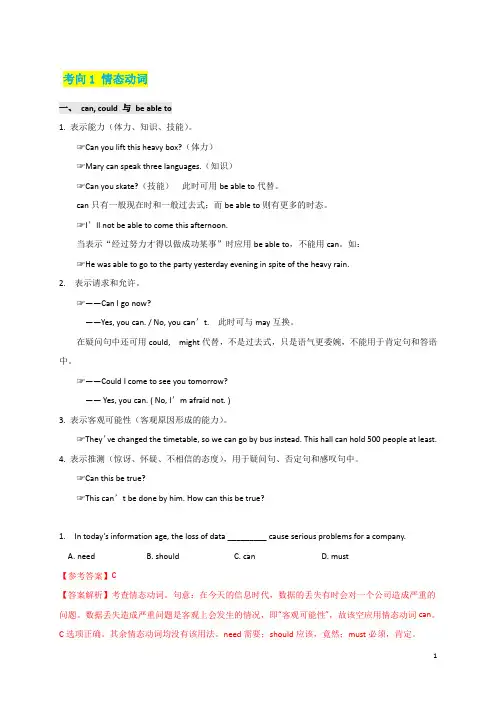
考向1 情态动词一、can, could 与be able to1. 表示能力(体力、知识、技能)。
☞Can you lift this heavy box?(体力)☞Mary can speak three languages.(知识)☞Can you skate?(技能)此时可用be able to代替。
can只有一般现在时和一般过去式;而be able to则有更多的时态。
☞I’ll not be able to come this afternoon.当表示“经过努力才得以做成功某事”时应用be able to,不能用can。
如:☞He was able to go to the party yesterday evening in spite of the heavy rain.2. 表示请求和允许。
☞——Can I go now?——Yes, you can. / No, you can’t. 此时可与may互换。
在疑问句中还可用could, might代替,不是过去式,只是语气更委婉,不能用于肯定句和答语中。
☞——Could I come to see you tomorrow?—— Yes, you can. ( No, I’m afraid not. )3. 表示客观可能性(客观原因形成的能力)。
☞They’ve changed the timetable, so we can go by bus instead. This hall can hold 500 people at least.4. 表示推测(惊讶、怀疑、不相信的态度),用于疑问句、否定句和感叹句中。
☞Can this be true?☞This can’t be done by him. How can this be true?1.In today’s information age, the loss of data _________ cause serious problems for a company.A. needB. shouldC. canD. must【参考答案】C【答案解析】考查情态动词。
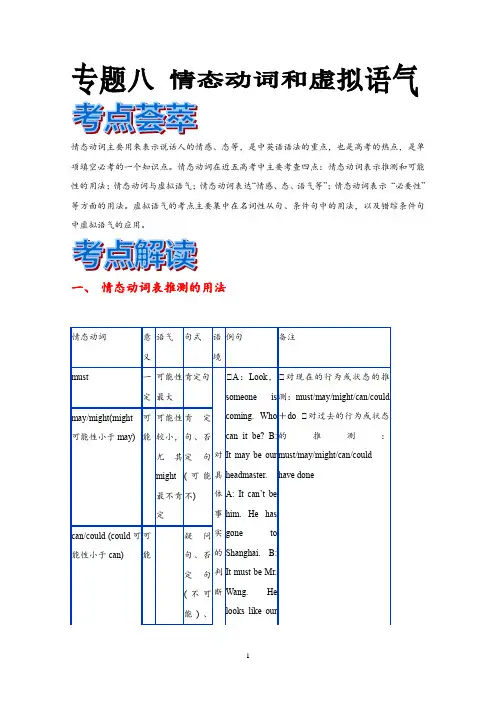
情态动词主要用来表示说话人的情感、态等,是中英语语法的重点,也是高考的热点,是单项填空必考的一个知识点。
情态动词在近五高考中主要考查四点:情态动词表示推测和可能性的用法;情态动词与虚拟语气;情态动词表达“情感、态、语气等”;情态动词表示“必要性”等方面的用法。
虚拟语气的考点主要集中在名词性从句、条件句中的用法,以及错综条件句中虚拟语气的应用。
一、情态动词表推测的用法headmaster.①That maynot be true.①He couldn'thavediscovered thetruth.注意:should (ought to)表示推测是高考考查的重点和难点。
如:—When can I come for the photos?I need them tomorrow afternoon.—They ________ be ready by 12:00.A.can B.should C.might D.need【解析】B A项表示推测时常用于否定句和疑问句中。
C项表示推测语气不太肯定。
should意为“按理说,理应”,既回答了顾客的询问,不失礼貌,又为照片有可能尚未洗好,顾客到时取不到留下了回旋的余地,体现了店主的精明与用词经过仔细推敲。
二、情态动词的其他用法1.can, could, may, might2.must, should3. need, dare4.shall/will/would4.shall/will/would4.shall/will/would二、情态动词+have done四、虚拟语气虚拟语气表示说话人所说的话不是事实,而是一种假设、愿望、怀疑或推测。
1.虚拟语气在条件句中的用法If it were to rain tomorrow, I should not drive my car. 如果明天下雨的话,我就不开车了。
(明天的情况还不知道)If I had done it in time, I should have had a good time. 如果我及时做的话,日子就好过多了。
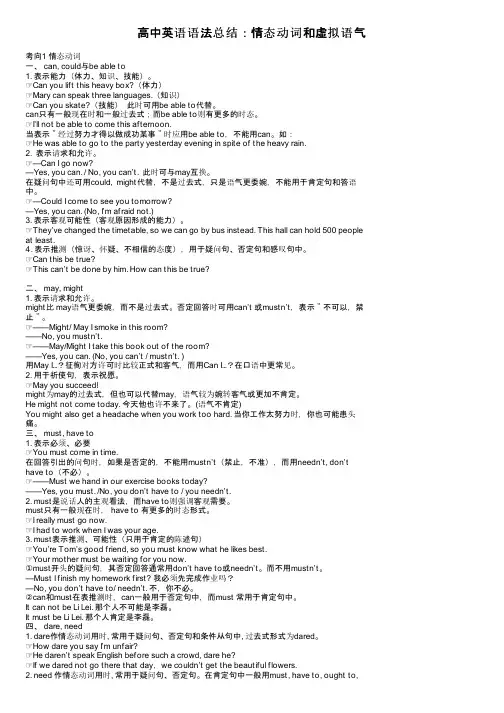
高中英语语法总结:情态动词和虚拟语气考向1 情态动词一、 can, could与be able to1. 表示能力(体力、知识、技能)。
☞Can you lift this heavy box?(体力)☞Mary can speak three languages.(知识)☞Can you skate?(技能)此时可用be able to代替。
can只有一般现在时和一般过去式;而be able to则有更多的时态。
☞I’ll not be able to come this afternoon.当表示"经过努力才得以做成功某事"时应用be able to,不能用can。
如:☞He was able to go to the party yesterday evening in spite of the heavy rain.2. 表示请求和允许。
☞—Can I go now?—Yes, you can. / No, you can’t. 此时可与may互换。
在疑问句中还可用could, might代替,不是过去式,只是语气更委婉,不能用于肯定句和答语中。
☞—Could I come to see you tomorrow?—Yes, you can. (No, I’m afraid not.)3. 表示客观可能性(客观原因形成的能力)。
☞They’ve changed the timetable, so we can go by bus instead. This hall can hold 500 people at least.4. 表示推测(惊讶、怀疑、不相信的态度),用于疑问句、否定句和感叹句中。
☞Can this be true?☞This can’t be done by him. How can this be true?二、 may, might1. 表示请求和允许。
might比 may语气更委婉,而不是过去式。
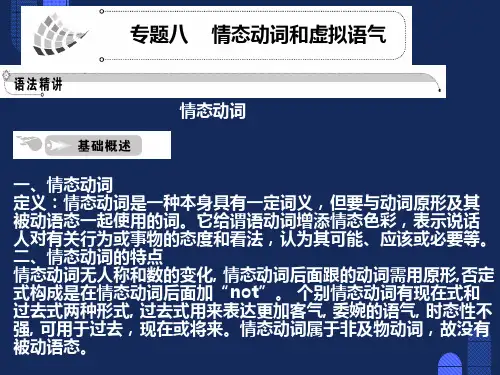
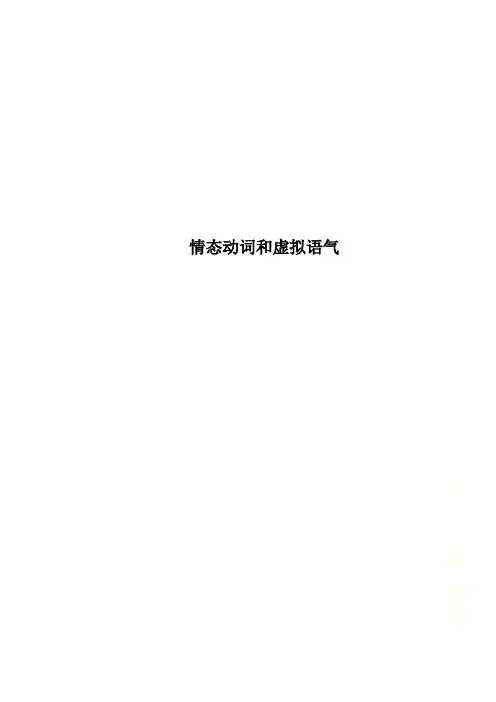
情态动词和虚拟语气情态动词主要用来表示说话人的情感、态度等,是中学英语语法的重点,也是高考的热点,是单项填空必考的一个知识点。
情态动词在近五年高考中主要考查四点:情态动词表示推测和可能性的用法;情态动词与虚拟语气;情态动词表达“情感、态度、语气等”;情态动词表示“必要性”等方面的用法。
虚拟语气的考点主要集中在名词性从句、条件句中的用法,以及错综条件句中虚拟语气的应用。
一、概念1.什么是情态动词本身有一定词义,是表达说话人的情感、态度、语气的词,其作用是给动词增添感情色彩②表现形式:情态动词+动词原形/be2.特点①没有人称和数的变化②不能直接跟宾语,必须搭配实义动词或be动词的原形③情态动词的过去式往往不表时态,而表示更加委婉的语气。
例句:Can/could you help me?2.情态动词的表现形式1)情态动词+do例句:We must help each other to overcome the difficulties.You shouldn’t be so careless.2)情态动词+be doing例句:She must be sleeping now.My mother may/might be cooking now 3)情态动词+be done例句:Difficulties can and must be overcome. Something must be done to stop pollution.4)情态动词+have done例句:You ought to have come earlier.They might have finished the work.二、情态动词的分类1.只能作情态动词:must, can/could, may/might2.可作情态动词也可作助动词的:will/would, shall/should3.可作情态动词有可作实义动词的:need,dare4.具有情态动词特征的:ought to, have to, beable to三、分类讲解1.can /could1)表示能力:会,在表示过去的能力时用could 例句:I can swim.Lucy can dance well and her mother could dance well when she was young.The cinema can seat 500 people.I could not read such an easy book when I was 7 years old.2)表允许,许可常用在口语中,此时could 不表示过去式,而表示语气上比can更客气。
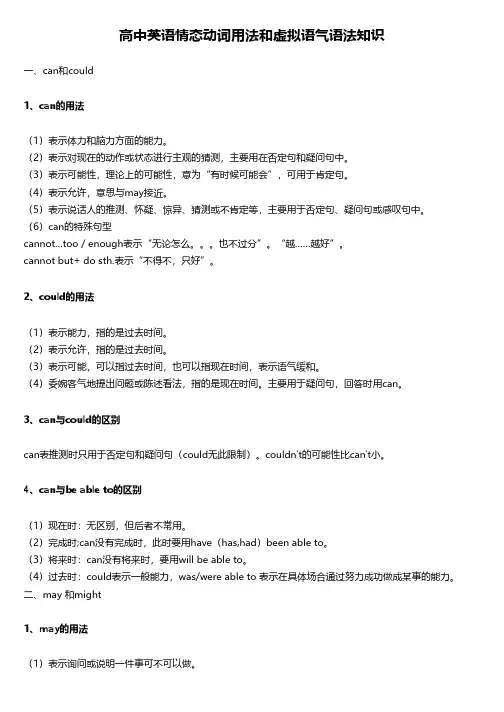
高中英语情态动词用法和虚拟语气语法知识一、can和could1、can的用法(1)表示体力和脑力方面的能力。
(2)表示对现在的动作或状态进行主观的猜测,主要用在否定句和疑问句中。
(3)表示可能性,理论上的可能性,意为“有时候可能会”,可用于肯定句。
(4)表示允许,意思与may接近。
(5)表示说话人的推测、怀疑、惊异、猜测或不肯定等,主要用于否定句、疑问句或感叹句中。
(6)can的特殊句型cannot…too / enough表示“无论怎么。
也不过分”。
“越……越好”。
cannot but+ do sth.表示“不得不,只好”。
2、could的用法(1)表示能力,指的是过去时间。
(2)表示允许,指的是过去时间。
(3)表示可能,可以指过去时间,也可以指现在时间,表示语气缓和。
(4)委婉客气地提出问题或陈述看法,指的是现在时间。
主要用于疑问句,回答时用can。
3、can与could的区别can表推测时只用于否定句和疑问句(could无此限制)。
couldn't的可能性比can't小。
4、can与be able to的区别(1)现在时:无区别,但后者不常用。
(2)完成时;can没有完成时,此时要用have(has,had)been able to。
(3)将来时:can没有将来时,要用will be able to。
(4)过去时:could表示一般能力,was/were able to 表示在具体场合通过努力成功做成某事的能力。
二、may 和might1、may的用法(1)表示询问或说明一件事可不可以做。
(2)表示一件事或许会发生或某种情况可能会存在,通常用在肯定句和否定句中。
注意:表示可能性时,can't语气强,表示“不可能”,may not语气弱,表示“可能不”。
2、might的用法(1)表示询问或允许,指的是过去时间。
(2)表示可能发生的事,可以指过去时间,也可以指现在时间,语气更加不肯定,可能性比may小一些。
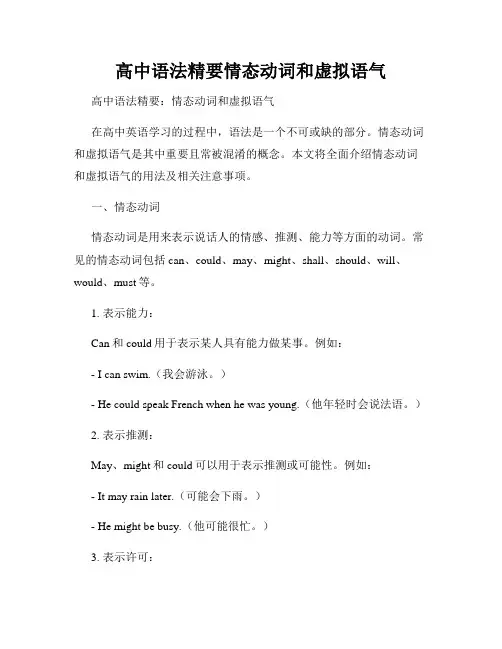
高中语法精要情态动词和虚拟语气高中语法精要:情态动词和虚拟语气在高中英语学习的过程中,语法是一个不可或缺的部分。
情态动词和虚拟语气是其中重要且常被混淆的概念。
本文将全面介绍情态动词和虚拟语气的用法及相关注意事项。
一、情态动词情态动词是用来表示说话人的情感、推测、能力等方面的动词。
常见的情态动词包括can、could、may、might、shall、should、will、would、must等。
1. 表示能力:Can和could用于表示某人具有能力做某事。
例如:- I can swim.(我会游泳。
)- He could speak French when he was young.(他年轻时会说法语。
)2. 表示推测:May、might和could可以用于表示推测或可能性。
例如:- It may rain later.(可能会下雨。
)- He might be busy.(他可能很忙。
)3. 表示许可:Can和may用于表示允许或许可。
例如:- Can I go to the bathroom?(我可以去洗手间吗?)- May I borrow your pen?(我可以借用你的笔吗?)4. 表示建议和意愿:Should和would常用于表示建议、意愿或假设情况。
例如:- You should eat more vegetables.(你应该多吃蔬菜。
)- I would like some tea, please.(我想要一些茶,谢谢。
)二、虚拟语气虚拟语气是用来表示非现实情况或假设情况的一种语气形式。
在高中英语中,虚拟语气主要包括与过去事实相反的虚拟语气、与现在事实相反的虚拟语气、与将来事实相反的虚拟语气以及情态动词的虚拟语气等。
1. 与过去事实相反的虚拟语气:与过去事实相反的虚拟语气常由"were"来表示,无论主语是单数还是复数,都使用"were"。
情态动词与虚拟语气情态动词是英语中一类特殊的动词,它们用于表达说话人的情态、态度、能力、推测和意愿等,如can、could、may、might、shall、should、will、would、must等。
而虚拟语气则是一种语法形式,用来表示非真实、假设、愿望、建议、命令等。
情态动词和虚拟语气常常结合使用,以表达一定的假设、愿望或建议等含义。
一、情态动词的用法1. 表示能力和许可:can、could、may、might情态动词can表示一种能力或技能,表示某人有能力完成某事。
例如:He can play the piano very well.(他弹钢琴弹得很好。
)情态动词could表示过去的能力或技能,常用于否定句或疑问句中。
例如:I couldn't find my keys this morning.(今天早上我找不到我的钥匙。
)情态动词may和might表示允许或许可的意思,也可以表示推测或猜测。
注意may是一种程度上更强的允许,而might则程度上会稍微弱一些。
例如:You may leave the party early if you want.(如果你愿意,你可以早点离开派对。
)I might go to the movies tonight.(今晚我可能去看电影。
)2. 表示推测和猜测:must、should、would情态动词must表示说话人确定的推测和猜测,表示事实的推测,带有较强的肯定意义。
例如:She must be tired after running a marathon.(她参加完马拉松赛后一定很累。
)情态动词should表示一种合理的推测和猜测,表示根据某种常理或按照经验而做出的推测。
例如:He should be at home now because he usually comes back at this time.(他应该在家,因为他通常在这个时间回来。
高考英语语法复习情态动词与虚拟语气知识讲解一、情态动词(1)表示能力时,can只用于一般现在时,could仅用于一般过去时;而be able to则有更多的时态,如将来时、完成时等。
I haven’t been able to read that report yet.He will be able to skate as well as you.(2)Was/were able to表示能力时,侧重经过努力而成功做到某事;而could仅表示具备能力,不说明是否实施了能力。
He studied hard and was able to pass the exam.(3)用在其他动词,如might,may,would,want,hope等之后表示能力只能用be able to。
He might be able to fix your car.(1)must还可以表示质问或感情色彩,意为“偏要,偏偏”。
Why must it snow on Saturday?(2)should还可以表示惊奇、愤怒、失望等特殊情感,尤其用在以why,who,how等开头的疑问句中或某些感叹句中。
why should you be so late today?(1)must作“必须”讲的一般疑问句,其肯定回答用must,否定回答用needn’t或don’t have to。
-Must I pay now?-Yes, you must./No, you needn’t.(2)need还可以作实义动词,有人称和数的变化,后跟带to的不定式作宾语。
She needed to go out for a walk.(1)两者在表示过去的习惯动作或行为时常可通用。
When we were children, we would/used to go skating every winter.(2)Used to与would都不能与表示具体频率、次数的词及特定的时间状语或具体的一段时间连用。
高中英语语法讲义——情态动词和虚拟语气情态动词:有词义无人称和数的变化,必须和动词一起构成谓语(+ do表现在/将来,+have done表过去),可进行句式转换。
1,表能力can 一般能力,只用于现在时和过去时。
He can swim across the river .be able to 特殊能力(有条件),用于所有时态。
He’s able to swim across the river in 5 minutes.2, 表推测肯定句(强到弱): must / have to,should/ ought to, may, might / couldThat may be our bus now .(有可能). That might/ could be our bus now .(有怀疑)否定句(强到弱): can’t(不可能), couldn’t , shouldn’t, may not (可能不),might not .The boy on the playground can’t be Li Lei , for he is studying at school at present.Take it easy . you may not have failed in the test.疑问句: can, could .There is someone knocking on the door. Who can it be ?题组训练:(1)Although you _________find bargains in London , it’s not generally a cheap place to shop .(2)Life is unpredictable ; even the poorest _______ become the richest .(3)Harry is feeling uncomfortable .He __________(drink)too much at the party last night .3,表必要,义务/责任必要性: must / have to do, needn’t / don’t have to , needn’t have done(过去没必要做而做了)Must I finish writing my composition now ?Yes , you must . / No, you needn’t/ don’t have to .You needn’t have come so early this morning. The class begins at 8:00 every day .义务/责任: should do , should have done .You should work hard at all your subjects .You should have come here on time yesterday . Why not ?题组训练(4)I’ve prepared all kinds of food for the picnic.--- Do you mean we ____bring anything with us ?(5)Sorry ,Professor Smith .I didn’t finish assignment yesterday.--- Oh, you ___ have done it as yesterday was the deadline .4, 表请求、建议、命令、允许、禁止请求、建议: Shall / May + 1 / 3 人称… ? Will / would + 2 人称… ? Can / Could … ?May/ Can I come in ? Yes , you may / can . No , you can’t / mustn’t.Shall the worker get a rise this month ?Will / Would you do me a favor ?注意: could 提问一般用can 回答Could I use your dictionary ? Yes , you can . No , I’m afraid not .命令must ,should/ ought to , shouldn’t /oughtn’t to. 禁止mustn’t . 允许may / might, canYou must go to bed by 10:00 pm. You shouldn’t stay up too late .You mustn’t be late for class . You may / might / can leave the window open.题组训练(6)_________ I have a word with you ? It won’t take long .(7)The room is too dirty ._________ we clean it ?5, 表意愿、决心、许诺、宣布法规命令、许诺、宣布法规: 2 / 3 人称+ shall …First of all , every adult shall obey the laws. The possessions shall be divided into 4 parts.意愿、决心:所有人称+ will / would …Welcome to Xueda any time if you will宁愿做:would rather do , would rather do … than do … , would do .. rather than do … ,would rather sb had done(过去)…/ did (现在/将来)… .prefer to do , prefer to do … rather than do … , prefer doing … to doing … .题组训练:(8)Why didn’t you come to Simon’s party last night ? I wanted to .But my mom simply ______not let me out so late at night.(9)The school rules state that no child ______ be allowed out of the school during the day unless accompanied by an adult .6 , 表习惯、倾向叙述真理、目前习惯:will / won’tCars won’t run without gas . She will watch V oice of China on Fridays .过去习惯:would / wouldn’t 但used to do 强调现在不做了。
语法专项情态动词一.情态动词的含义:情态动词只有情态意义,即表示说话人对动作的观点,如需要,可能,意愿或怀疑等。
情态动词主要有:can(could), may(might), must, shall(should), will(would), need, dare(dared), have to(had to),ought to, had better,would rather, used to等。
二.情态动词的特征:1.在形式上,情态动词没有实义动词的各种变化,只有could, would, had to, might, should等几个过去式。
其他如must, ought to等的过去式皆与现在式同形,且在各种人称后都用同样的形式。
2.在意义上,大多数情态动词有多个意义。
如can可表示“能够”,“可能”,“允许”等。
3.在用法上。
情态动词(除ought后接不定式外)与助动词一样,后接动词原形构成谓语动词。
三.情态动词的用法:(一)can/could的用法:1.表示能力:①表示现在的能力用can;表示过去的一般能力用could,若表示过去经过努力而做成某事,则用was/were able to do sth. 或managed to do sth. 或succeeded in doing sth.---Everyone here can speak English. (现在的能力)---A fire broke out in the hotel last night, but everyone was able to escape. (经过努力做成某事)②表示将来的能力常不用can,而用will be able to的将来时态:---I’ll be able to speak French in another few months.2.表示请求许可:若表示请求别人允许自己做某事,can/could均可,could表示委婉语气。
情态动词与虚拟语气一、情态动词1.Can/could①表示能力:能/可以/会(could为过去式)②表示请求:可以(一般用于疑问句,could表示更委婉)注:could提问时,回答不能用could例:Could I smoke here?Yes,you can/No,you can’t③表示推测:不可能can't/couldn't(只用在否定句)注:表示推测时也可以用在疑问句或肯定句,但是很少,常见的例句:Can/Could it be true?That can/could be......2.may/might①表示请求:可以(一般用于疑问句,might表示更委婉)注:May提问,否定回答mustn't/can't②表示推测:也许(might比may可能性小)3.Must①表示命令/警告:必须(否定为mustn't“禁止”)注:must提问,否定回答needn't/don't have to②表示推测:一定(否定为can't“不可能”)4.will/would①用于构成将来时②表示意愿:会5.Need①实义动词need to do/need doing②情态动词(一般只用在疑问句或否定句)6.had better最好(注意否定had better not)7.Dare 敢(习惯接不定式,不过to也可以省略)8.Should ①应该②竟然注:ought to=should 应该9.have to 不得不Have to表示客观影响,must强调主观意愿10.be able to=canbe able to有时态变化,可以与其他情态动词连用,can不可以;另外,be able to更强调历经磨难,通过努力得到成功二、情态动词+have done1.三个推测(对过去的推测)①must have done:一定做了...②may/might have done:也许做了...③can't have done:肯定没做...2.could have done:本来能够做...例:You could have made greater progress,but you didn't.3.should/ought to have done:本该做...(却没做)4.needn't have done:本不必做...(却做了)5.Would have done:本会做...(实际上没做到)三、虚拟语气1.if的非真实条件句中例:①If I were you,I would accept his advice②If it rained/should rain/were to rain tomorrow,I would stay at home③If you had studied hard before,you would have passed the exam△if从句中,were/had/should可以放在句首(部分倒装),此时if必须省略,且否定词not不能放在前面例:①If I hadn't seen him then,I wouldn't have been very happy→Had I not seen him then,I wouldn't have been very happy②If I were you,I would accept his advice→Were I you,I would accept his advice2.错综时间条件句谓语动词根据句子本身的时态自行变化例:If you had followed my advice just now,you would be better now3.含蓄虚拟语气在某些介词存在的句子中,如果出现非真实的情况,要使用虚拟语气,常见的介词有:with/without/but for/or/but/otherwise等规则:例:①I was ill that day,otherwise,I would have taken part in the meeting②Without electricity,human being life would be quite different today4.wish与if only例:①I wish he could visit us tomorrow②If only you had listened to our advice!5.would rather(宁愿)/would sooner(宁可)/would as soon(宁愿)例:①I’d rather you came here tomorrow②I’d rather you hadn't told me the truth6.as if/as though例:①He looks as if he were an artist②He talked about the accident as though he had seen it7.用于建议(advise/suggest/propose/recommend)、命令(order/command)、要求(demand/require/request/desire/ask)、坚持要求(insist)、催促(urge)的从句中。